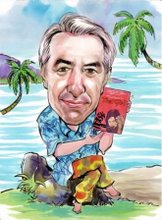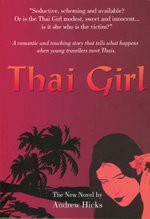
A scrawled poster pasted up during the recent demonstrations in Bangkok suggests the wide popular nature of the protest. But was it, as the much criticised media coverage suggested, a genuine peoples's movement for democracy or was it in fact a power struggle by new monied interests seeking to seize power from the traditional elites? Where does the truth lie and what's next for Thailand?

The protester organisers passionately wanted to be non-violent.

Bangkok is a vibrant city that relies on armies of cheap labour.

Petty traders survive there just as they would back in the village.

Or they work on construction sites in appalling conditions.

Their salvation is finding support and community in adversity.

They are building a sleek airport rail link that they'll never use.

Getting to work means a hot bus toiling in traffic.

Or riding a smelly boat on Klong San Saeb.

Once a year at Songkhran, the Thai New Year, they have a few days off to go home to the village, fighting for a seat at Moh Chit bus station.
It strikes me that Thai politics never seems to address the key issues of the day but creates dominant personality cults and focuses solely on the politicians themselves. Which war lord is going to grab power next and what vested interests do they serve? Thus politics is not so much a contention between opposing principles and ideas but a crude struggle for power between rival patronage groupings.
Living in a village in Isaan I see this even at the local level. Elections here are always welcomed as you’ll hope to collect a few hundred baht for the promise of your vote. A candidate for a minor position in local government, orbortor or whatever, invests a considerable sum to buy his way into power but winning the post will reap a useful dividend. Nothing can ever be had without being bought.
Even a farang living in Thailand openly gets asked for bribes by officials and many times I’ve been stopped by police asking for cash before going on my way. Right up the ladder to the top, office holders use their position for their own benefit. Nobody did this better than Thaksin Shinawatra who used the government coffers to buy the favour of the ordinary voters and became unusually rich during his terms of office. As he was the first leader to make it his policy to benefit the poor farmers, his followers now do not begrudge him his questionable billions.
Every political movement or party, even a street protest, whether Yellow or Red shirted, thus needs a powerful backer dispensing patronage. Even if you are an ordinary worker sincere in your protest you cannot survive at the barricades without being paid 200 baht a day. A genuine mass movement of the rural poor can thus be hijacked and distorted by those who use it in pursuit of power.
So what of the recent disturbances in Bangkok? Were they a genuine struggle for democracy by the disenfranchised poor or something else entirely? Was it instead a power struggle in which the traditional political, bureaucratic and military elites were resisting an alliance of the newly rich and the rural poor?
Perhaps it was both, a broad populist movement which came to be bankrolled and controlled by another patronage grouping seeking power. If the Red Shirt movement was a grass roots movement of ordinary people seeking to better their lives, they soon lost control of it and it became something else entirely. Sadly, the underlying imbalances within Thai society and the sharing of political power and wealth remain unresolved.
So was it a genuine populist movement or a crude struggle between opposing interest groups? Whatever view you take, as one strips away more skins of the tear stained onion of Thai politics, there is always another layer beneath.
A Comment on my previous blog article, “Thai Rural Poverty - A Powder Keg?”, recommended an article in Newsweek as a good analysis of the current situation. (See www.newsweek.com/2010/06/04/the-end-of-brand-thailand.html) This boldly stated that of South East Asia’s modern economies, ‘only Thailand is disintegrating’ and is ‘becoming ungovernable and a failed state’.
That’s not how it feels living in Thailand though.
At the time of the troubles, if you were not in the immediate vicinity of the disturbances, life went on as normal. This does not feel anything like a failed state but is a well-managed and broadly stable society.
In the last fifty years the country has in fact made enormous strides, creating an impressive infrastructure of roads, power supply, schools and hospitals even in the remotest areas, everything managed by a clunkingly complex bureaucracy.
Through the Thaksin years and beyond, outward signs of increasing prosperity have been increasingly evident in the countryside, even if this has been partly based on inward remittances. The comprehensive powers of the police and bureaucracies and the influence of the Chinese dominated commercial sector means that the country is effectively run. Nonetheless, a deferential society such as this may allow pressures and resentment to build up if power is imposed from above and wealth is not equitably shared.
Newsweek ascribes Thailand’s relative decline to a poor education system based on rote learning and to concentrating on lower value manufacturing for foreign companies. At an early stage of its development, this approach has served Thailand well, though as Singapore realized in the eighties, lower wage economies can soon become uncompetitive and it is then necessary to gear up and go ‘hi-tech’.
Basic education that avoids critical thinking and maintaining low wages is an essential of the old approach and a cause of dissention today. Thailand’s mass labour that fuels the factories is made up of economic migrants from the countryside who passively work for poor wages, but as they become more urbanized and aware, it is they who are now protesting.
Newsweek sees a dangerous polarization between the Yellow and Red factions, though that observation states the growing problem rather than identifying solutions. In conclusion, statesmanlike leadership has been lacking, it says, and is needed to pull Thailand out of it present troubles.
Of recent prime ministers, the spatula wielding Samak, who was removed from office by the courts for hosting a TV cooking programme, was the antithesis of statesmanship. However, Thaksin himself had many leadership qualities and even occasionally talked about the rule of law. The current prime minister, Abhisit Vejajiva is a man of considerable political skill who would impress any audience for his grasp of democratic principle and who looks good on the international stage.
Yet he is in a bind that no one man could disentangle, nor would his backers want a different allocation of power and wealth. A general election is, however, due some time in 2012, so Abhisit’s task is to grimly hang onto power for as long as he can, aware that the will of the people is likely to upset the applecart and hand power back to the other side.
A further layer to the onion of Thai politics is its history. Thailand is still a young country and the democratic revolution begun in 1932 when the absolute monarchy was abolished is not yet complete. Furthermore, its far provinces are only recently integrated and then imperfectly. The northern kingdom of Lanna with its centre in Chiang Mai was substantially cut off by the mountains until recently, and the jungly scarps of the Korat plateau made Isaan, the great north east, very difficult of access from Bangkok.
Only by herculean feats of civil engineering were railways pushed through at the beginning of the twentieth century to make the nation a manageable political entity. (See “How the Trains Made Thailand”, my blog article of 31September 2010.)
On many occasions during the nineteenth and twentieth centuries the peoples of Isaan have resisted rule from distant Bangkok and these rebellions have been firmly put down. A major communist movement in the north east during the Cold War era was perhaps the last of these insurrections, but the tensions have not yet gone away.
Sanitsuda Ekachai, a columnist for the Bangkok Post uses the term ‘racist nationalism’ to describe the expectation of the central Thai power elite that the minorities should conform to their brand of ‘Thainess’ and be culturally assimilated. The failure of the clod-hopping Laos of Isaan to conform to that stereotype condemns them to exclusion and ridicule and to be the eternal funny men of every comedy and farce on Thai television.
Newly developing societies often progress at two speeds but the divisions in Thai society are glaring with few opportunities for the poor and minimal social mobility. The privileged seem satisfied with the status-quo. I recently read an articulate but angry rant by a highly educated Thai against the Red Shirts. She argued that the protests were risking the economy and her long running gravy train. Why couldn’t they just go back to their buffaloes was the underlying theme. After all, if Thai farmers are poor that can only be because they’re stupid.
It strikes me that educated urban Thais often seem to know or understand little of the conditions in which rural people live; or they don’t want to know. There is also a tendency to say that some of the protesters behaved badly and so the grievances of the poor should be dismissed. However, the Red Shirts do not formally represent the interests they claim to speak for and violence on the fringes of the protest in no way devalues the complaints of the poor.
Now the Thai farmers are losing patience. Thaksin gave them a taste of what was possible for them and understandably they want more. The trouble is that conducting a peoples’ protest pure and simple is well nigh impossible in Thailand and even if they can eventually exert their power at the ballot box they will almost certainly choose the wrong leaders.
It is highly ironic who they seem to have chosen as their champion so far!
In conclusion, there are many new nations where a comprehensive corruption of power allows office holders at all levels to use their position primarily to benefit themselves, where the police can be bought and the rule of law does not operate. It is always hard to see away out.
So which way Thailand now?
There are no glib answers but the Thais do have a knack for soldiering on in adversity and slow progress towards a modern state is always possible. However, the present tensions will grumble on until the centre of gravity in Thai politics shifts quite radically against the traditional holders of power and the economy is rebalanced to allow a fairer sharing of wealth and opportunity with mass labour.
My own key idea is that a major policy of regional development should be developed to devolve factories to provincial centres, thus taking the modern economy to the rural areas. To bring jobs to the people could thus help save the essence of Thai rural society which currently is disintegrating as workers migrate to the bloated urban centres.
It won’t be easy though and it will take time.
Andrew Hicks The ‘Thai Girl’ Blog June 2010.





12 comments:
Andrew what a fantastic post, brilliantly written but I don't think I have the intelligence or political knowledge to add much to it.
I do agree with practically all you have written and especially about moving new industry to the rural areas, that would be a good thing if it ever happens.
I believe most of the Ratchaprasong protesters were peaceful people looking for a fairer share of Thailand's wealth and future prosperity. I hadn't looked at it as being two elite groups locked in battle for control of the money pot. I don't think the poor rural people looked at it that way either and probably still don't now, I do however believe you are right with your assessment.
Great post.
Andrew a very enjoyable read that puts a few things in perspective for me.
Here in PKK we have a solid Chinese business community pulling the strings.
My neighbours who are not in this elite are currently sitting outside their home bending metal(for building use) to earn 2 Baht per Kilo they produce.
They actually seem happy but even here(yellow shirt territory) there is such an obvious gap in the social structure.
To me with my limited exposure to Thailand I tend to blame the education system for many of the woes the country is enduring.
In my partners family for example, she is the only child of eight to complete High School. At the opposite end of the scale my neighbours mother(60) can neither read or write Thai.
In my very humble opinion an educated population, encouraged to think critically, is what Thailand needs. Given this people can then challenge the system and bring about genuine change.
Thailand is now ruled from Bangkok by an oligarchy of military and elites who justify control by claiming to be protecting the monarchy against red "terrorists" and republicans. Abhisit is only the front man. In the provinces there is a crisis of rising expectations brought on by economic advances and, via Thaksin, expectations of more than have been thwarted. This potent mix historians believe resulted in the French Revolution. Repression, censorship and reeducation are what's offered rather than any reconciliation or business investment in dangerous territory. Only the event we cannot discuss will change the game.
Absolutely agree with Dr. Will. The red shirt movement isn't over. Too many are sick of being ruled by the corrupt elite and by Abhisit who wouldn't know how to govern if somebody hit him over the head with the Constitution (although Thailand has had so many by now, it's hard to know which one they'd hit him with :)
As a Brit I just find it embarrassing that an Oxford University education produces this inept of a prime minister.
A very clear and well-reasoned account of the present impasse in Thailand, its origins, and possibilities for its eventual resolution. Excellent.
thank you for posting the 5th-7th photos - they show the kind of conditions that daily wage labourers from Isaan live & work in in the capital. & this includes 12-13 y/o teenagers.
Tractor dealers, condominiums, student dormitories, convenience stores are getting built everywhere you go in Sakon Nakhon. They sell high-end ice cream at the local shopping hub. There are at least six fabulous coffee shops with bakeries and boutique coffee. The younger generation of Thais here are smart, savvy and motivated. They're looking for ways to stay in Issan, but make Bangkok wages. Mosts of the adults I know under 50 are pursuing graduate degrees. It's not a little village in a rice field anymore.
just finished reading 'my thai girl and i'. thoroughly enjoyed it.ive lived and worked in brunei for nearly 20 years, with my brunei wife.
being an expat is great, it really opens up a lot of new perspectives on life in general.
ron knox, http://jaggededge01.blogspot.com/
I agree with most of your well-written post about Thailand. And I too believe that education for all is the way to go.
But after reading about the teacher scandal where a huge percentage of Thai teachers failed their own subjects. And high school at that (who flunks high school?) I just shook my head.
http://www.bangkokpost.com/news/local/38353/teachers-fail-exams-on-own-subjects
So much in Thailand is broken, so, where to start?
This is a great read...well analysed and I congratulate you.Jenny
Nothing relevant has been censored. The comments removed were spam.
Andrew
thank you
Post a Comment